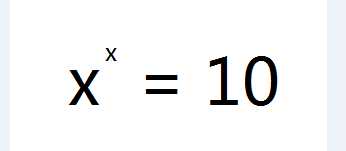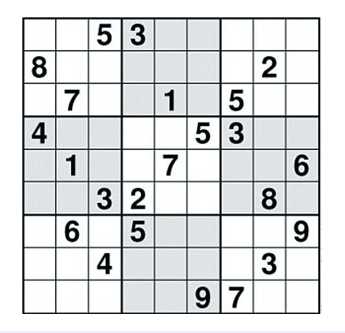标签:多个 system.in 提交 else 笔记 val 4.0 子串 技术
目录
前言:以下代码仅供参考,若有错误欢迎指正哦~
一个串的子串是指该串的一个连续的局部。如果不要求连续,则可称为它的子序列。 比如对串: "abcdefg" 而言,"ab","abd","bdef" 等都是它的子序列。 特别地,一个串本身,以及空串也是它的子序列。 对两个串而言,可以有许多的共同的子序列,我们关心的是:它们所共同拥有的长度最大的子序列是多长。以下代码实现了这个问题的求解。请填写划线部分缺失的代码。 注意:只填写缺少的代码,不要写任何多余的内容,比如注释或说明文字。 public class Zixulie { public static int f(String x, String y) { if(x.length()==0) return 0; if(y.length()==0) return 0; String x1 = x.substring(1); String y1 = y.substring(1); if(x.charAt(0)==y.charAt(0)) return f(x1,y1)+1; return __________________________; } public static void main(String[] args) { System.out.println(f("ac","abcd")); //2 System.out.println(f("acebbcde1133","xya33bc11de")); //5 } } 答案:Math.max(f(x, y1),f(x1, y))
历史上有许多计算圆周率pai的公式,其中,格雷戈里和莱布尼茨发现了下面的公式: pai = 4*(1-1/3+1/5-1/7 ....) 参见【图1.png】 这个公式简单而优美,但美中不足,它收敛的太慢了。 如果我们四舍五入保留它的两位小数,那么: 累积1项是:4.00 累积2项是:2.67 累积3项是:3.47 。。。 请你写出它累积100项是多少(四舍五入到小数后两位)。 注意:只填写该小数本身,不要填写任何多余的说明或解释文字。 答案:3.13

1 public class Main { 2 3 public static void main(String[] args) { 4 double result = 0; 5 for(int i = 1;i <= 100;i++) { 6 double b = 2 * i - 1; 7 if(i % 2 == 1) { 8 result = result + 1 / b; 9 } else { 10 result = result - 1 / b; 11 } 12 } 13 System.out.printf("%.2f", (4*result)); 14 } 15 16 }
如果x的x次幂结果为10(参见【图1.png】),你能计算出x的近似值吗? 显然,这个值是介于2和3之间的一个数字。 请把x的值计算到小数后6位(四舍五入),并填写这个小数值。 注意:只填写一个小数,不要写任何多余的符号或说明。 答案:2.506184

1 public class Main { 2 3 public static double min = 10; 4 5 public static void main(String[] args) { 6 double result = 0; 7 for(double i = 2.5;i <= 2.6;i = i + 0.00000001) { 8 double r = Math.abs(10 - Math.pow(i, i)); 9 if(min > r) { 10 min = r; 11 result = i; 12 } 13 } 14 System.out.printf("%.6f", result); 15 System.out.println("\n"+result); 16 System.out.println(Math.pow(result, result)); 17 } 18 19 }
今有7对数字:两个1,两个2,两个3,...两个7,把它们排成一行。 要求,两个1间有1个其它数字,两个2间有2个其它数字,以此类推,两个7之间有7个其它数字。如下就是一个符合要求的排列: 17126425374635 当然,如果把它倒过来,也是符合要求的。 请你找出另一种符合要求的排列法,并且这个排列法是以74开头的。 注意:只填写这个14位的整数,不能填写任何多余的内容,比如说明注释等。 答案:74151643752362
1 public class Main { 2 3 public void swap(int[] A, int i, int j) { 4 int temp = A[i]; 5 A[i] = A[j]; 6 A[j] = temp; 7 } 8 9 public void dfs(int[] A, int step) { 10 if(step == A.length) { 11 StringBuffer s = new StringBuffer(""); 12 for(int i = 0;i < A.length;i++) 13 s.append(A[i]); 14 boolean judge = true; 15 String s1 = s.toString(); 16 for(int i = 1;i <= 7;i++) { 17 int a = s1.indexOf(i+""); 18 int b = s1.lastIndexOf(""+i); 19 if(b - a != i + 1) { 20 judge = false; 21 break; 22 } 23 } 24 if(judge) 25 System.out.println(s1); 26 return; 27 } else { 28 for(int i = step;i < A.length;i++) { 29 if(A[step] == 7 || A[step] == 4) 30 dfs(A, step + 1); 31 if(A[i] == 7 || A[i] == 4) 32 continue; 33 swap(A, i, step); 34 dfs(A, step + 1); 35 swap(A, i, step); 36 } 37 } 38 } 39 40 public static void main(String[] args) { 41 Main test = new Main(); 42 int[] A = {7,4,1,1,2,2,4,3,7,3,5,5,6,6}; 43 test.dfs(A, 0); 44 } 45 }
勾股定理,西方称为毕达哥拉斯定理,它所对应的三角形现在称为:直角三角形。 已知直角三角形的斜边是某个整数,并且要求另外两条边也必须是整数。 求满足这个条件的不同直角三角形的个数。 【数据格式】 输入一个整数 n (0<n<10000000) 表示直角三角形斜边的长度。 要求输出一个整数,表示满足条件的直角三角形个数。 例如,输入: 5 程序应该输出: 1 再例如,输入: 100 程序应该输出: 2 再例如,输入: 3 程序应该输出: 0 资源约定: 峰值内存消耗(含虚拟机) < 256M CPU消耗 < 1000ms 请严格按要求输出,不要画蛇添足地打印类似:“请您输入...” 的多余内容。 所有代码放在同一个源文件中,调试通过后,拷贝提交该源码。 注意:不要使用package语句。不要使用jdk1.7及以上版本的特性。 注意:主类的名字必须是:Main,否则按无效代码处理。
1 import java.util.Scanner; 2 3 public class Main { 4 public static long n; 5 public static int result; 6 7 public void getResult() { 8 for(long i = 1;i < n;i++) { 9 for(long j = n - i + 1;j < n;j++) { 10 long temp = i * i + j * j; 11 if(temp == n * n && j >= i) 12 result++; 13 } 14 } 15 System.out.println(result); 16 } 17 18 public static void main(String[] args) { 19 Main test = new Main(); 20 Scanner in = new Scanner(System.in); 21 n = in.nextLong(); 22 test.getResult(); 23 } 24 25 }
你一定听说过“数独”游戏。 如【图1.png】,玩家需要根据9×9盘面上的已知数字,推理出所有剩余空格的数字,并满足每一行、每一列、每一个同色九宫内的数字均含1-9,不重复。 数独的答案都是唯一的,所以,多个解也称为无解。 本图的数字据说是芬兰数学家花了3个月的时间设计出来的较难的题目。但对会使用计算机编程的你来说,恐怕易如反掌了。 本题的要求就是输入数独题目,程序输出数独的唯一解。我们保证所有已知数据的格式都是合法的,并且题目有唯一的解。 格式要求,输入9行,每行9个字符,0代表未知,其它数字为已知。 输出9行,每行9个数字表示数独的解。 例如: 输入(即图中题目): 005300000 800000020 070010500 400005300 010070006 003200080 060500009 004000030 000009700 程序应该输出: 145327698 839654127 672918543 496185372 218473956 753296481 367542819 984761235 521839764 再例如,输入: 800000000 003600000 070090200 050007000 000045700 000100030 001000068 008500010 090000400 程序应该输出: 812753649 943682175 675491283 154237896 369845721 287169534 521974368 438526917 796318452 资源约定: 峰值内存消耗(含虚拟机) < 256M CPU消耗 < 2000ms 请严格按要求输出,不要画蛇添足地打印类似:“请您输入...” 的多余内容。 所有代码放在同一个源文件中,调试通过后,拷贝提交该源码。 注意:不要使用package语句。不要使用jdk1.7及以上版本的特性。 注意:主类的名字必须是:Main,否则按无效代码处理。

1 import java.util.Scanner; 2 3 public class Main { 4 public static int[][] group = new int[9][9]; 5 public static int[][] value = new int[9][9]; 6 public static int[][] row = new int[9][9]; 7 public static int[][] ring = new int[9][9]; 8 public static int[][] get_group = new int[9][9]; 9 10 public void init() { 11 String[] S = new String[9]; 12 for(int i = 0;i < 3;i++) { 13 S[i] = "000111222"; 14 S[3 + i] = "333444555"; 15 S[6 + i] = "666777888"; 16 } 17 for(int i = 0;i < 9;i++) 18 for(int j = 0;j < S[i].length();j++) 19 group[i][j] = S[i].charAt(j) - ‘0‘; 20 for(int i = 0;i < 9;i++) 21 for(int j = 0;j < 9;j++) { 22 row[i][j] = -1; 23 ring[i][j] = -1; 24 get_group[i][j] = -1; 25 } 26 } 27 28 public void dfs(int step) { 29 if(step == 81) { 30 for(int i = 0;i < 9;i++) { 31 for(int j = 0;j < 9;j++) 32 System.out.print(value[i][j]); 33 System.out.println(); 34 } 35 return; 36 } else { 37 int x = step / 9; 38 int y = step % 9; 39 if(value[x][y] > 0) 40 dfs(step + 1); 41 else { 42 for(int i = 1;i <= 9;i++) { 43 if(row[x][i - 1] == -1 && ring[y][i - 1] == -1 && 44 get_group[group[x][y]][i - 1] == -1 && value[x][y] == 0) { 45 value[x][y] = i; 46 row[x][i - 1] = 1; 47 ring[y][i - 1] = 1; 48 get_group[group[x][y]][i - 1] = 1; 49 dfs(step + 1); 50 value[x][y] = 0; 51 row[x][i - 1] = -1; 52 ring[y][i - 1] = -1; 53 get_group[group[x][y]][i - 1] = -1; 54 } 55 } 56 } 57 } 58 } 59 60 public static void main(String[] args) { 61 Main test = new Main(); 62 test.init(); 63 Scanner in = new Scanner(System.in); 64 for(int i = 0;i < 9;i++) { 65 String s = in.next(); 66 for(int j = 0;j < s.length();j++) { 67 int t = s.charAt(j) - ‘0‘; 68 value[i][j] = t; 69 if(t != 0) { 70 row[i][t - 1] = 1; 71 ring[j][t - 1] = 1; 72 get_group[group[i][j]][t - 1] = 1; 73 } 74 } 75 } 76 test.dfs(0); 77 } 78 }
给定平面内平行于坐标轴的一个矩形,从矩形内选 择一些点,从这些点向右和向上各射出一条射线, 请问:这些射线将矩形分成了多少份。 数据格式: 输入的第一行包含两个整数x, y,表示矩形是由(0, 0), (x, 0), (x, y), (0, y)四个点围成的。 第二行包含一个整数n,表示矩形内的点的数量。 接下来n行,每个两个整数xi, yi,表示矩形内的一 个点。输入保证所有的点都在矩形内部而且没有两 个点有相同的横坐标或纵坐标。 输出一个整数,表示从给定的点射出的射线将矩形 分成的份数。 例如,输入: 10 10 3 1 3 3 1 2 4 程序应该输出: 6 【数据规模和约定】 对于10%的数据,1<=n<=10,1<=x, y<=100; 对于30%的数据,1<=n<=1000, 1<=x,y<=1000; 对于60%的数据,1<=n<=10000, 1<=x,y<=1000000; 对于100%的数据,1<=n<=100000, 1<=x,y<=1000000000,1<xi<x,1<yi<y。 资源约定: 峰值内存消耗(含虚拟机) < 256M CPU消耗 < 1000ms 请严格按要求输出,不要画蛇添足地打印类似:“ 请您输入...” 的多余内容。 所有代码放在同一个源文件中,调试通过后,拷贝 提交该源码。 注意:不要使用package语句。不要使用jdk1.7及 以上版本的特性。 注意:主类的名字必须是:Main,否则按无效代码 处理。 以下代码仅供参考,不保证答案的正误哦。
1 import java.util.ArrayList; 2 import java.util.Arrays; 3 import java.util.Collections; 4 import java.util.Comparator; 5 import java.util.Scanner; 6 7 public class Main { 8 public static long x, y; 9 public static int n; 10 public static Point[] P; 11 public static long count = 1; 12 public static ArrayList<Integer> list = new ArrayList<Integer>(); 13 14 class MyComparator implements Comparator<Point> { 15 16 public int compare(Point arg0, Point arg1) { 17 if(arg0.x > arg1.x) 18 return 1; 19 else if(arg0.x < arg1.x) 20 return -1; 21 else if(arg0.x == arg1.x) { 22 if(arg0.y > arg0.y) 23 return 1; 24 else if(arg0.y < arg0.y) 25 return -1; 26 else 27 return 0; 28 } 29 return 0; 30 } 31 32 } 33 34 static class Point { 35 public int x; 36 public int y; 37 38 public Point(int x, int y) { 39 this.x = x; 40 this.y = y; 41 } 42 } 43 44 public void getResult() { 45 Arrays.sort(P, new MyComparator()); 46 list.add(P[n - 1].y); 47 count++; 48 for(int i = n - 2;i >= 0;i--) { 49 if(P[i].x == P[i + 1].x) { 50 if(P[i + 1].y > P[i].y) { 51 int j = list.indexOf(P[i + 1].y); 52 list.remove(j); 53 list.add(P[i].y); 54 } 55 count++; 56 } 57 else { 58 Collections.sort(list); 59 int j = 0; 60 for(;j < list.size();j++) 61 if(list.get(j) >= P[i].y) 62 break; 63 count = count + j + 1; 64 if(!list.contains(P[i].y)) 65 list.add(P[i].y); 66 } 67 } 68 System.out.println(count); 69 } 70 71 public static void main(String[] args) { 72 Main test = new Main(); 73 Scanner in = new Scanner(System.in); 74 x = in.nextLong(); 75 y = in.nextLong(); 76 n = in.nextInt(); 77 P = new Point[n]; 78 for(int i = 0;i < n;i++) { 79 int x = in.nextInt(); 80 int y = in.nextInt(); 81 P[i] = new Point(x, y); 82 } 83 test.getResult(); 84 } 85 }
算法笔记_214:第六届蓝桥杯软件类校赛真题(Java语言A组)
标签:多个 system.in 提交 else 笔记 val 4.0 子串 技术
原文地址:http://www.cnblogs.com/liuzhen1995/p/6884171.html